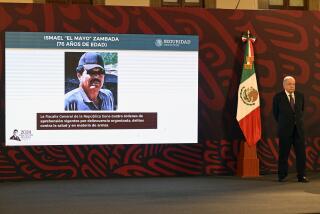U.S., Mexico Vow Better Communication
WASHINGTON — Papering over Mexican anger about a big cross-border sting, the attorneys general of the United States and Mexico agreed Thursday to keep each other fully informed about sensitive law enforcement activities and to ensure that police in each country understand the laws in the other.
In a letter signed at a ceremony in the border town of Brownsville, Texas, Attys. Gen. Janet Reno and Jorge Madrazo Cuellar pledged to avoid actions that could damage relations between the two countries. They also agreed to improve law enforcement cooperation across the board.
The letter, addressed to Presidents Clinton and Ernesto Zedillo, was drafted in response to Mexico’s heated complaints about Operation Casablanca, the biggest money-laundering probe in U.S. history.
The sting ended in May with the indictment of three Mexican and four Venezuelan banks and the arrest of 167 individuals, including 26 Mexican bankers, on charges of converting millions of dollars in illicit drug profits into ostensibly legitimate bank accounts.
Claiming that they had been taken by surprise by the secret operation--much of it carried out in Mexico--Mexican officials said the dispute was so serious that it could damage anti-drug cooperation between the two governments. Mexico accused U.S. agents of violating Mexican law.
Reno and Madrazo agreed to install a hotline between their offices and to provide advance notice of sensitive cross-border law enforcement activities.
But in a key exception, the letter stated that notification would not be required if disclosure “might place the life of law enforcement agents or others at risk.” A Justice Department official said that provision was “clearly intended for a Casablanca-type case.”
In Operation Casablanca, undercover U.S. Customs agents in Mexico bribed Mexican bankers to cleanse profits from Latin American drug syndicates. Two weeks after the arrests were announced, Mexico acknowledged that it had been informed of the operation two years ago. But officials said the United States had withheld crucial details, and, in any case, Mexico did not consent to the use of its territory.
Even Secretary of State Madeleine Albright expressed concern about the way in which the operation was conducted, complaining to U.S. law enforcement officials that the sting threatened to damage U.S.-Mexico relations.
Clinton and Zedillo agreed last month at a special U.N. General Assembly session about drugs to order their justice departments to establish guidelines for law enforcement cooperation.
Besides pledging more effective exchanges of information, Reno and Madrazo agreed to consult before undertaking significant law enforcement activities in other countries if the operations might affect either the United States or Mexico. They also agreed to conduct joint training among law enforcement agencies to increase understanding of the laws of the other country.
The agreement authorizes the continued activities of “law enforcement officials based in the other country’s territory.” That category includes the U.S. Customs agents involved in Operation Casablanca. Mexican officials had suggested earlier that they might bar U.S. undercover agents from working in Mexico.
“Coordination and cooperation in law enforcement can often produce successful results beyond what can be achieved individually,” Reno and Madrazo wrote.
Despite the disagreements over Operation Casablanca, the Justice Department said Washington and Mexico City have forged an admirable record of law enforcement cooperation over the past few years.
For instance, the department said, 11 Mexican nationals have been deemed by Mexico to be legally subject to extradition; they are being held by Mexican authorities pending completion of the appeals process. In addition, a record 23 fugitives were returned from Mexico to the United States last year.
As another example of close coordination, the department cited a cooperative effort to prosecute members of the Logan Heights gang in the San Diego area. It said members of the street gang were used by the Arellano Felix Mexican drug cartel to commit murders and other crimes on both sides of the border.
Times staff writer Ronald J. Ostrow contributed to this report.
More to Read
Sign up for Essential California
The most important California stories and recommendations in your inbox every morning.
You may occasionally receive promotional content from the Los Angeles Times.









